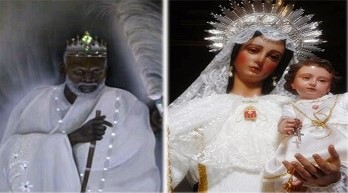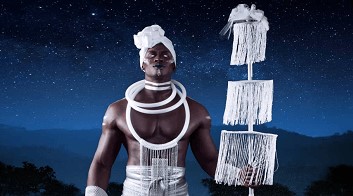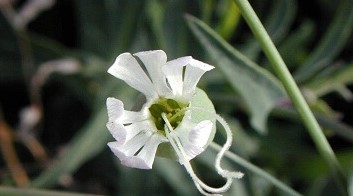All About Obatalá: Learn what his most important prayer is, how to attend it, what paths he opens, and what his favorite herbs are.
In the Yoruba religion, better known as Santeria, there are a large number of deities. One of them is the Orisha Obatala, one of the most important gods in the pantheon. His devotees often wear bracelets or necklaces in his honor.
As one of the most important gods in this pantheon, he is known for being the creator of all the earth and the one in charge of creating humans.
Who is Obatala?
He is an Orisha belonging to the Yoruba pantheon. He is a deity full of purity and luminosity. Known as the possessor of all that is white, the ruler of the minds of all people, with the ability to control both the thoughts and dreams of every human being.
Son of Olofin and Oloddumare. Upon descending to earth, they brought Obatala to be responsible for the creation of everything capable of creating life.
Obatala is the supreme orisha of creation, purity, and justice, and is recognized as the father of all orishas. In Yoruba mythology, Obatala is responsible for molding humanity with clay and giving form to life. His associated color is white, symbolizing purity, peace, and spiritual enlightenment. He is the figure of wisdom, justice, and impartiality, and his followers seek to emulate these qualities in their daily lives.
The children of Obatalá are those devotees who are dedicated to following the paths of their father orisha. These individuals are characterized by their search for truth, their kindness, and their balance. Obatalá’s children are said to have a special connection to the spiritual world and generally have a calm, thoughtful, and just personality.
In the Catholic Religion

According to the Catholic religion, Obatala is identified as the Virgin of Mercy. This is primarily due to the color white and its use.
In Cuba, his followers and devotees attend processions to the Church of Las Mercedes in Havana to pay tribute to the Orisha every September 24th.
In Santeria
From the various existing stories, Obatala is known as an Irunmole (human), given that when he was an earthly being, he made many mistakes and later became an Orisha.
As a human, he was king of the Igbo, an ancient group of people belonging to the Yoruba territories. He was also known as Obatala, which means king of all purity. He sought to keep everything pure, clean, and clear.
Obatala in Spiritism: The Connection with Light and Supreme Wisdom
In the world of Spiritism, Obatala holds a very important place, although his interpretation and role may vary depending on the school of thought within this religious movement. Although Obatala is primarily recognized in Santeria as the orisha of wisdom, justice, and purity, his presence in Spiritism also has a great impact, as he is associated with light, protection, and the spiritual elevation of human beings.
Obatalá in Spiritism: The Supreme Spirit and Protector
Spiritism, a doctrine that originated in the 19th century with Allan Kardec, establishes that human beings are constantly in contact with the spiritual world. Within this framework, elevated spirits or spiritual entities like Obatalá are responsible for guiding, protecting, and assisting humanity in its process of spiritual evolution and growth. Although Spiritism is not based on the veneration of orishas as in Santería, many high-level spirits, like Obatalá, play key roles in the protection and development of individuals on their spiritual path.
The Spiritual Light of Obatalá
In Spiritism, Obatalá is synonymous with divine light. He is seen as a spiritual being who represents purity and higher wisdom. He is one of the highest spirits who helps mediums connect with the spiritual worlds and receive messages from higher beings. His energy is associated with mental clarity and the ability to discern between right and wrong. Thus, in Spiritism, Obatalá is not only a source of protection, but also of spiritual enlightenment.
Obatalá as the Spirit of Justice
As in Santería, where Obatalá is the orisha of justice and equity, in Spiritism, his energy is seen as a spiritual guide for those seeking justice in their lives. Mediums and those who practice mediumship often invoke his help when seeking conflict resolution or when facing situations of injustice. Obatalá, as the wisest spiritual being, represents impartiality and the need for balance in all aspects of life.
How Obatalá’s Energy Manifests in Spiritism
Spiritual Guidance and Protection
In Spiritism, Obatalá manifests as a supreme spiritual guide. People who feel lost or need direction in their lives often invoke his help. His energy is serene and peaceful, providing a sense of calm and security. The mediating spirits who work with him tend to be calm and wise, offering advice that seeks harmony between the spiritual and physical worlds.
Raising Consciousness
Obatalá is also associated with raising consciousness. It is believed that by connecting with this spirit, people can achieve greater mental clarity and inner peace. This is especially important in the context of Spiritism, where spiritual evolution and personal growth are paramount. By being closer to Obatalá’s energy, individuals can find a clear path to purification and spiritual development.
Mediums and Obatalá
In many spiritualist practices, mediums are believed to have the ability to contact the spirits of the orishas, or higher spirits. Obatalá, being such a higher spirit, often presents himself through mediums in spiritual sessions. His presence is associated with the feeling of being in a safe space, where truth and justice prevail. The messages received from Obatalá are often filled with wisdom, patience, and discernment.
Obatalá and Spiritual Medicine
In Spiritism, he is also associated with spiritual healing. Obatalá’s energy is said to be able to cleanse individuals of negative energies and facilitate both physical and emotional healing. His presence helps those seeking to restore their inner balance, especially those who feel unbalanced or affected by negative emotions such as anger, fear, or grief.
Furthermore, Obatalá is believed to have the ability to release spiritual blockages, helping people heal from within and restoring peace and well-being. In many healing practices, purification rituals and prayers to Obatalá are performed to free patients from unwanted energies.
Obatalá and Spiritist Rites
Although Obatalá does not have a formal cult in Spiritism as he does in Santería, some Spiritist groups pay homage to him through rituals that include prayers, meditations, and spiritual baths. In these rituals, he is asked for help in achieving balance and harmony in all aspects of life.
Spiritual cleansing baths with white or light-colored herbs are commonly used in these rituals to invoke Obatalá’s energy. In some cases, deep meditation and visualization are recommended to connect with his energy and gain the spiritual wisdom necessary to guide the person’s path.
What is his day?

All deities have a special day for offerings or rituals. Obatala’s special day is September 24th each year. Offerings can be made with food or herbs pleasing to this Yoruba deity.
Short phrases alluding to Obatala are also recited.
The phrase is “Jekúa Babá!”, which is said as an exclamation.
You must pray from the depths of your heart and soul, so that you can create a connection, and Obatala can notice it on this date.
In addition, you can also offer food or sweets. These can be things like milk, plain rice, or soursop. The food should be primarily white, without salt.
How to pray to him?
When praying to Obatala, you must do so in the Yoruba language, as this is the traditional way the Yoruba worship their gods. This can increase the effectiveness of the connection you can establish with Orisha. The prayer is as follows:
“Iba Obatala, Iba Oba Igbo, Iba Oba, N’le ifon, O fi koko rumo ala
Òrìsà ni ma sin. Osha ni ma sin. Orisha no more sni
Obatala o su n’un àlà. tu o ji n’un àlà. Obatala o tinu ala dide. A-di-ni boitti, Mo juba. Ase.”
It is important that you also recite the greeting prayer for the Orisha:
“Obatalá, Obataisa, Obatayanu
Jekua ashó Babá buké buké obirinigua
Lanu Ayáguna eleyigbó jekua Babá.”
How to care for him?
It is very important to properly care for this saint. As an Orisha of peace, as well as wisdom, he will not tolerate harsh words, irritation, disrespect, or nudity.
- The ritual vessels must always be clean.
- Cover them with a white cloth.
- When everything is clean, you must greet him with the phrase “Jekúa, Babá!”
- You must do this with devotion and wisdom,
- going directly to the point of your request.
- It is advisable to make offerings in the number 8, as it is the deity’s favorite number.
- Cover the objects with cotton and clean them with both cocoa butter and cascarilla.
What do you ask of him?
This saint primarily asks for respect. Therefore, you must be very careful with the words you say to him. Your behavior when making requests is one of obedience. What you ask of him must be just and necessary; this will make the god take your request into account.
Prayers and supplications are a way to establish a strong spiritual connection with the deity. This helps you ask for favors, aid, or protection.
What offerings are given?

There are different offerings that can be made to Obatala.
- One of the most typical and most commonly used is a simple bouquet of white flowers. It is highly appreciated by the Orisha. Offerings can be made on September 24th or on any other day.
- White sweets, especially a plate filled with meringue and topped with a small flag, are also offered.
- If they are animals, he accepts and appreciates offerings of white doves, hens, goats, and guineas. They must all be white and female.
- Regarding food, he prefers rice pudding and fruits such as soursop and pomegranate. He also prefers yams in root vegetables, saffron, lilies, and nightshade.
- Regarding plants and trees, these include acacia, cotton, mugwort, and coconut trees, among others.
- You can perform dances. This can be with a group of dancers or a few people. The dances have to be soft and calm, imitating an older man walking.
Obatala’s Pataki
¿Qué caminos tiene?
Existen múltiples caminos de Obatala, estos son algunos de los principales:
What paths does he have?

There are multiple Obatala paths, these are some of the main ones:
- Ayáguna: One of the youngest paths. In addition to white, a red color is also worn. It is not made with cocoa butter, but with corojo butter.
- Aguema or Alaguema: This one can be seen with a white accessory. It is represented by a chameleon.
- Babá Ashó: He wears a red ribbon around his waist. It can help you never lack work or sustenance for your family. He may also be known as Saint Joseph the Worker. White and transparent colors, as well as wooden or brown pieces.
- Obamoró: Known as one of the protective spirits of the earth. He is also known as the Nazarene for the difficult path he has endured. The pieces can be white and purple, as well as two made of soap water.
- Oshagriñan: Considered the messenger of Olofin, a guide of the ilé. His necklace can be made of both white and red beads, as well as a silver crucifix. Oshalufón or
- Obálufón: Considered a very ancient and supreme being. His entire body is always covered. Also known as the Most Holy One and elsewhere as Jesus of Nazareth.
- Oshanlá or Orishanlá: This is a feminine path. It is considered the representation of transformation and forgiveness.
- Yeku Yeku: Represented as an old man, primarily personified as wisdom, humanity, and humility. He has great patience to resolve problems with his children. Also known as the Holy Christ of Limpias. The necklaces are made of white and mother-of-pearl pieces.
- Babá Fururú: Graphically, he represents a wise man and a counselor who can teach younger people and can provide a kind of consolation for couples who cannot procreate. He is also known as Saint Joachim, father of the Virgin Mary.
What colors does he have?
There are different colors that can be used according to Obatala’s path. But the most preferred one for this entity is white. This makes him known as a merciful god, with great patience and love for many people.
What herbs are used for Obatala?

This entity may like many different herbs. Some are easier to find, others not. This usually depends on where you are currently. Now we’ll tell you which are the easiest and most convenient to obtain.
They are:
- Clove sap. It smells very similar to clove.
- Elderberry.
- Carquesa.
- Cotton. This is a very natural fiber with great importance in the world. And its color represents the purity associated with Obatala.
- White Christmas tree.
- Castor bean.
- Almond.
- Soursop or Annona muricata. It remains one of Obatala’s favorite fruits, as it is white and low in salt. Another important aspect is its sweetness.
Characteristics of the Children of Obatalá
Purity and Spiritual Wisdom
The children of Obatalá are known for their spiritual wisdom. This wisdom is not only intellectual but is linked to a deep understanding of the world and of themselves. They follow a path of internal growth, always seeking truth and clarity. Purity is another central characteristic of the children of Obatalá; they are expected to live their lives uprightly, avoiding lies, deceit, and corruption.
Justice and Equity
Obatalá is the orisha of justice and equity, and his children must follow this principle. This entails being impartial, fair, and balanced in all their actions. They are known for their ability to resolve conflicts fairly, balancing emotions and reason. The path of the children of Obatalá is one of harmony and peace.
Tranquility and Patience
The children of Obatalá are generally calm, patient, and serene. Patience is one of Obatalá’s most notable virtues, and his children must be able to remain calm even in difficult situations. This inner calm allows them to make balanced decisions and avoid impulsiveness.
How Do Obatalá’s Children Manifest in Daily Life?
Obatalá’s children are distinguished by their behavior and approach to daily life. Some of the most common ways in which their characteristics manifest are:
- Wise and Just Leadership: Obatalá’s children are often natural leaders, not because of their power or authority, but rather because of their ability to make fair and equitable decisions.
- Commitment to Peace: They are people who seek peace and harmony in their relationships and in their surroundings. Diplomacy and peaceful conflict resolution are prominent qualities in them.
- Living in Accordance with Morality: Obatalá’s children exemplify righteousness and morality. They live their lives according to high ethical and spiritual standards.
What Should Children of Obatalá Not Do?
Avoid Impurity and Dishonesty
Obatalá is the orisha of purity, so children of Obatalá must avoid any type of impurity, whether moral, emotional, or spiritual. They are expected to live honestly, avoiding deception and manipulation.
Not Giving In to Anger
One of the greatest challenges for children of Obatalá is controlling anger. Although they are calm people, they can sometimes be tempted by rage, which could distort their ability to be fair and balanced. It is essential for children of Obatalá to practice patience and self-regulation.
Offerings and Rituals for the Children of Obatalá
Traditional Offerings
Offerings to Obatalá are usually white, as this orisha is associated with purity and light. Children of Obatalá should offer foods such as:
- White rice
- White fruits (such as coconut and pear)
- Milk and butter (symbolizing purity)
- White flowers (especially roses and jasmine)
The offerings are placed on an altar dedicated to Obatalá, and the prayers should be of thanksgiving and supplication for wisdom and justice.
Purification Rites
Purification rites are essential for the children of Obatalá. These rituals seek to maintain the body and soul in a state of purity. Bathing with herbs such as rosemary or chamomile is common, as these plants are associated with spiritual cleansing.
If you want to know all the details about Obatala’s children, click here to read a full article about the goddess’s children.
The Meaning of the Relationship with Obatalá
Having a deep connection with Obatalá means being at peace with oneself and with the universe. Obatalá’s children not only follow a religious tradition, but also commit to living a life filled with wisdom, justice, and compassion. Their relationship with Obatalá is spiritual, but also deeply ethical and moral.
Obatalá is a deity of great importance in the Yoruba pantheon. Therefore, it is vital to know how to act in the presence of this entity, as well as how to conduct rituals and make offerings appropriately.
